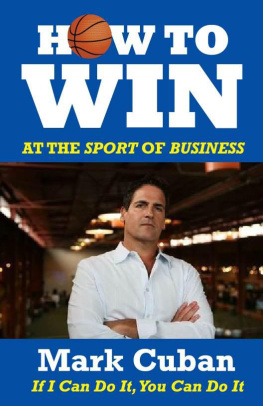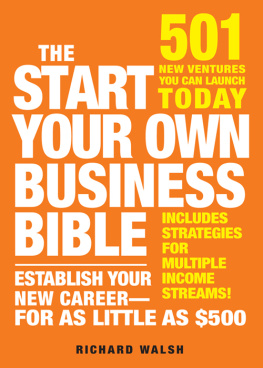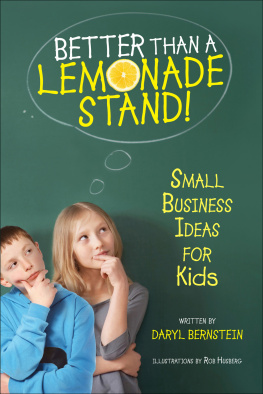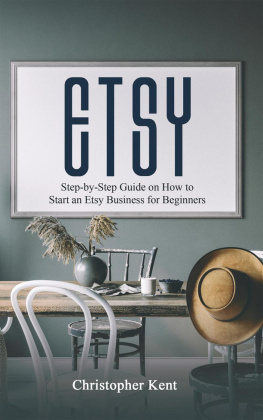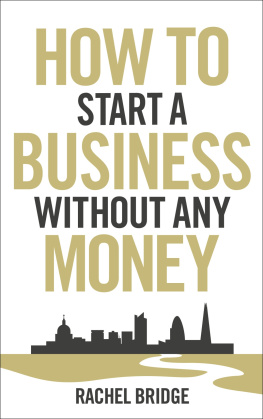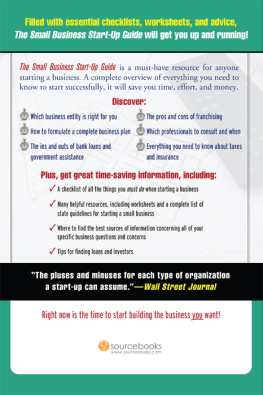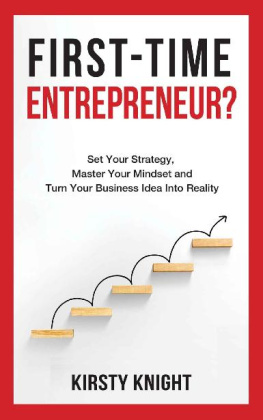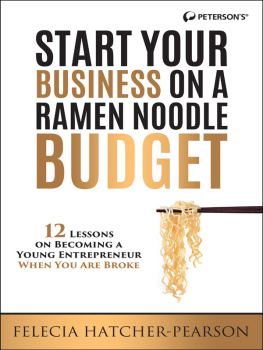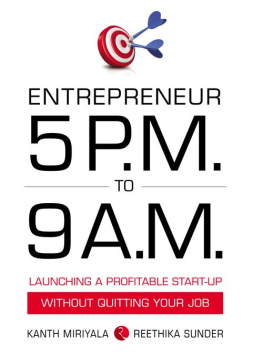


Diversion Books
A Division of Diversion Publishing Corp.
443 Park Avenue South, Suite 1004
New York, NY 10016
www.diversionbooks.com
Copyright 2018 by Matcha360 LLC, Patel Educational Services Inc. and Radical Investments LP
All rights reserved, including the right to reproduce this book or portions thereof in any form whatsoever.
DISCLAIMER AND LIMITATION OF LIABILITY
The information contained in Kid Start-Up is for general information purposes only. Starting and operating any business contains financial and other risks. The authors disclaim any express or implied warranties of any kind or nature regarding the contents of this book, including, without limitation, any legal, regulatory, financial, health or safety concerns arising from or relating to any business idea contained in this book. In no event will the authors be liable for any losses or damages of any kind or nature, including, but not limited to, direct, compensatory, consequential or other damages, attorneys fees or costs, arising from or relating to use of the information contained in this book. Parents are solely responsible for adequate supervision of their minor children and any associated legal, regulatory, financial, health and safety risks associated with use of any information contained in this book.
For more information, email
First Diversion Books edition August 2018.
Paperback ISBN: 978-1-63576-472-7
eBook ISBN: 978-1-63576-471-0
Printed in the U.S.A.
SDB/1808
1 3 5 7 9 10 8 6 4 2

ABOUT THE AUTHORS
Mark Cuban
Since the age of 12, Mark has been a natural entrepreneur. Selling garbage bags door to door, the seed was planted early on for what would eventually become long-term success. Cuban is now an American billionaire businessman, investor, film producer, author, television personality, philanthropist, and serial entrepreneur. He is the owner of the NBAs Dallas Mavericks, Landmark Theaters, and Magnolia Pictures, and the chairman of AXS TV. He is also a shark investor on ABCs hit primetime television show Shark Tank. Cuban is also the author of the bestseller How To Win At The Sport of Business.
Shaan Patel
Shaan has always been an entrepreneur at heart. In elementary school, he sold Pokemon cards. In middle school, he sold music CDs. In high school, he made thousands off internet referrals. In college, he made tens of thousands selling used iPhones on eBay. After achieving a perfect score on the SAT, Shaan founded his real business: Prep Experta test prep company offering SAT & ACT prep classes in twenty cities and online. Shaan appeared on Shark Tank to pitch Prep Expert and closed an investment deal with Mark Cuban. Patel is also the author of multiple bestselling SAT & ACT prep books.
Ian McCue
Ian is the founder and director of Spark Skill, an educational startup offering coding, design, and maker summer camps for tweens and teens. At just 16 years old, he is an entrepreneur with extensive experience in STEM and educational ventures, along with a passion for promoting youth engagement in coding, engineering, and business development.
LETTER FROM THE AUTHORS
Welcome! Every day, parents and their kids ask us for ideas on what kinds of businesses kids can start and run. Believe it or not, there are plenty of businesses that kids as young as 8 or 9 years old can start doing! Running a lemonade stand for a few hours is a great experience. However, there are so many more ways for a kid to not only gain valuable experience in the business world, but to earn some extra money as well.
We hope our book, Kid Start-Up, will give kids a great head start to launching their own age-appropriate business.
Let us know your thoughts by emailing us at:
Mark, Shaan, and Ian

TABLE OF CONTENTS

CHAPTER
1
WHAT IS AN
ENTREPRENEUR?

WHAT IS AN ENTREPRENEUR? |

WHAT DO YOU WANT TO BE
WHEN YOU GROW UP?
Have you ever been asked: What do you want to be when you grow up? Most kids reply with the following:
But have you ever heard someone say, I want to be an entrepreneur? Probably not. Thats because most people dont know what an entrepreneur is.
The dictionary defines an entrepreneur as a person who starts a business and is willing to risk loss in order to make money. Notice the key phrases in that definition: starts a business and to make money .
Thats because this book is really about entrepreneurship. Any kid that starts a business to make money is an entrepreneur.
So the next time you get asked what you want to be when you grow up, you can respond, I want to be an entrepreneur!
Entrepreneur comes from the French word entreprendre, which means to undertake. And thats exactly what it means to be an entrepreneur. In order to be an entrepreneur, you just have to undertake a business. This is not the same thing as having an idea. Billions of people
| KID START-UP

have ideas. But only a few people are willing to pursue those ideas and turn them into a real business.
Another word for anyone that starts a business is founder. If you start a business called Sweeties Lemonade Stand, then you are the founder of the Sweeties Lemonade Stand. So when you start a business, you can call yourself both an entrepreneur and a founder.
SUCCESSES & FAILURES:
ITS ALL PART OF THE
ENTREPRENEURSHIP GAME
Its not easy being an entrepreneur. You have to take a lot of risks. You risk your time. You risk your money. But you also have to risk what is often most special to people your reputation. What if you fail? Most kids do not want to fail, which prevents them from starting a business.
Do not worry. Every entrepreneur shares this fear of failing. Just go for it. No one knows whether or not they will succeed. You need to figure things out as you go thats the fun part about entrepreneurship!
Rejection is the necessary evil of entrepreneurship. There has never been an entrepreneur who succeeded without failing first. Steve Jobs, the founder of Apple, is no exception. In his 2005 graduation speech to Stanford University, Jobs described being fired from Apple in 1985 and says that it was the best thing that ever happened to [him].
WHAT IS AN ENTREPRENEUR? |
Unlike many people who would quit after such a big rejection, Steve Jobs did not. He continued following his love of technology by starting two other very successful companies. It is this kind of passion that makes entrepreneurs like Steve Jobs great. Jobs would later go back to Apple when the company saw how successful he could be without them.


